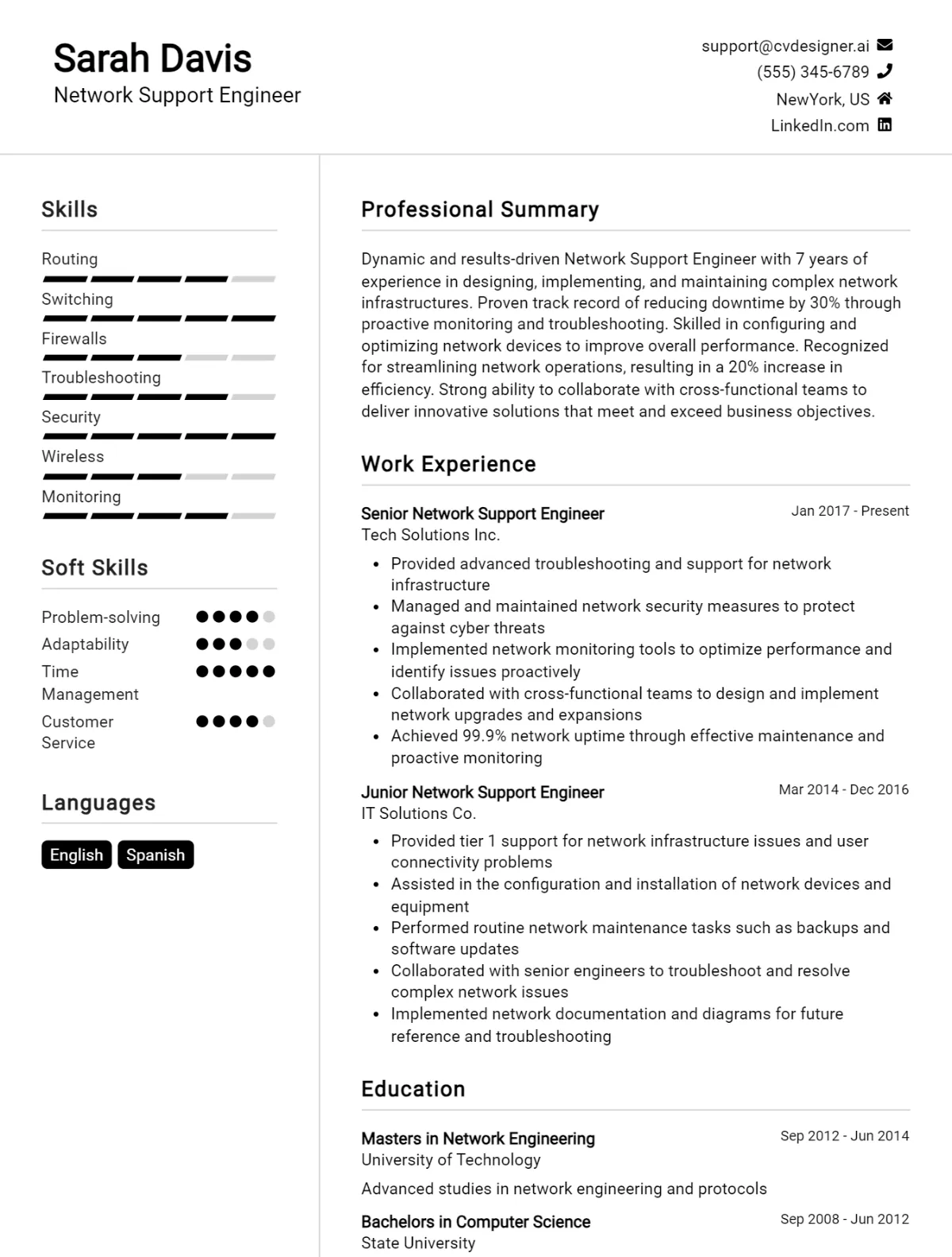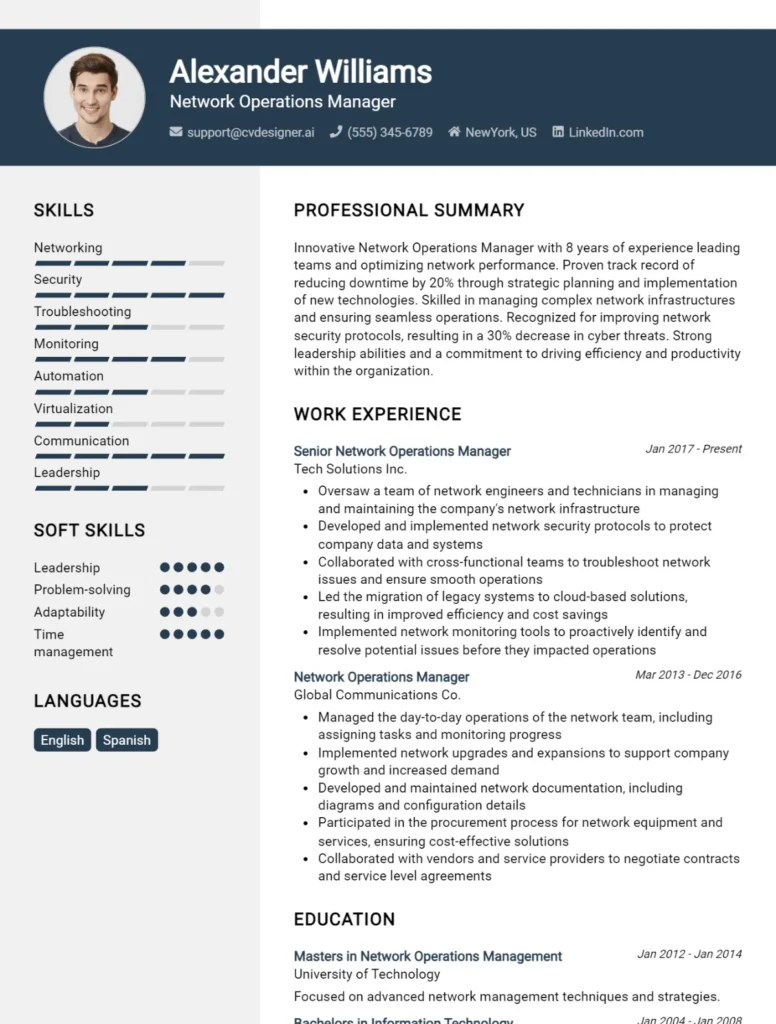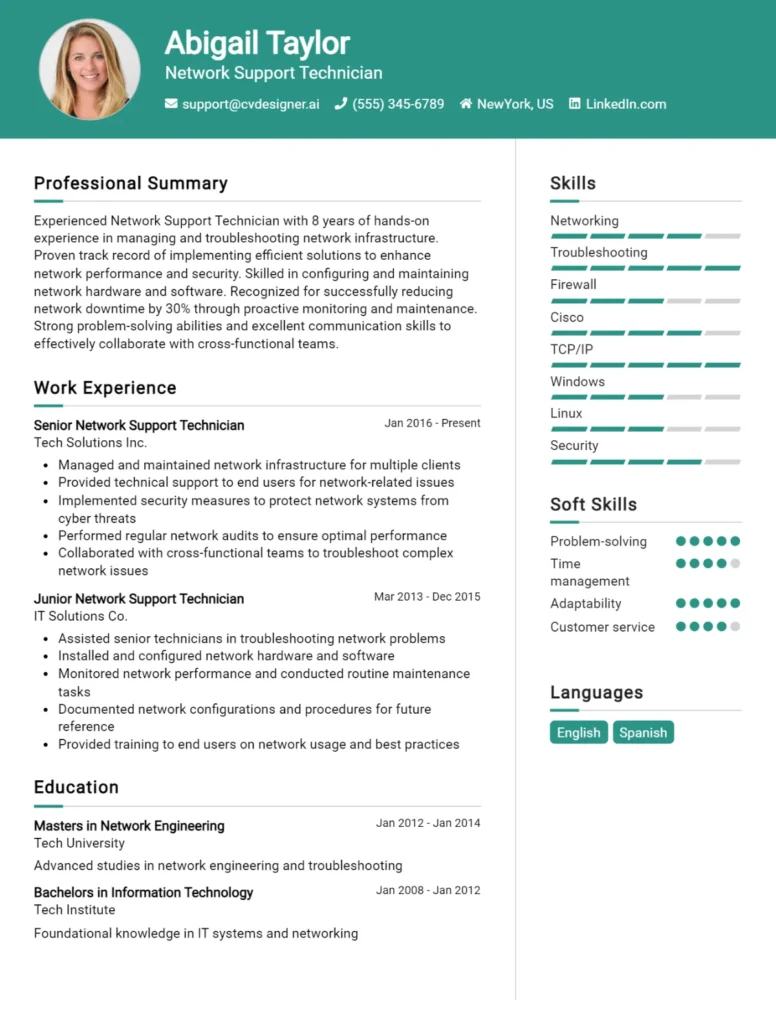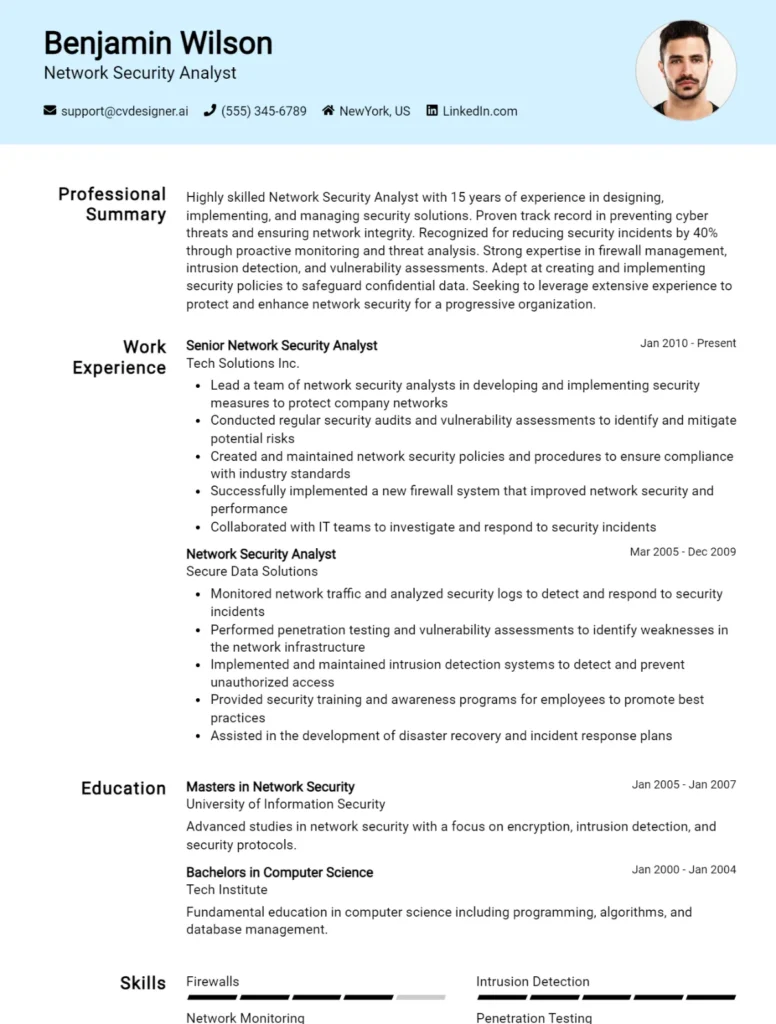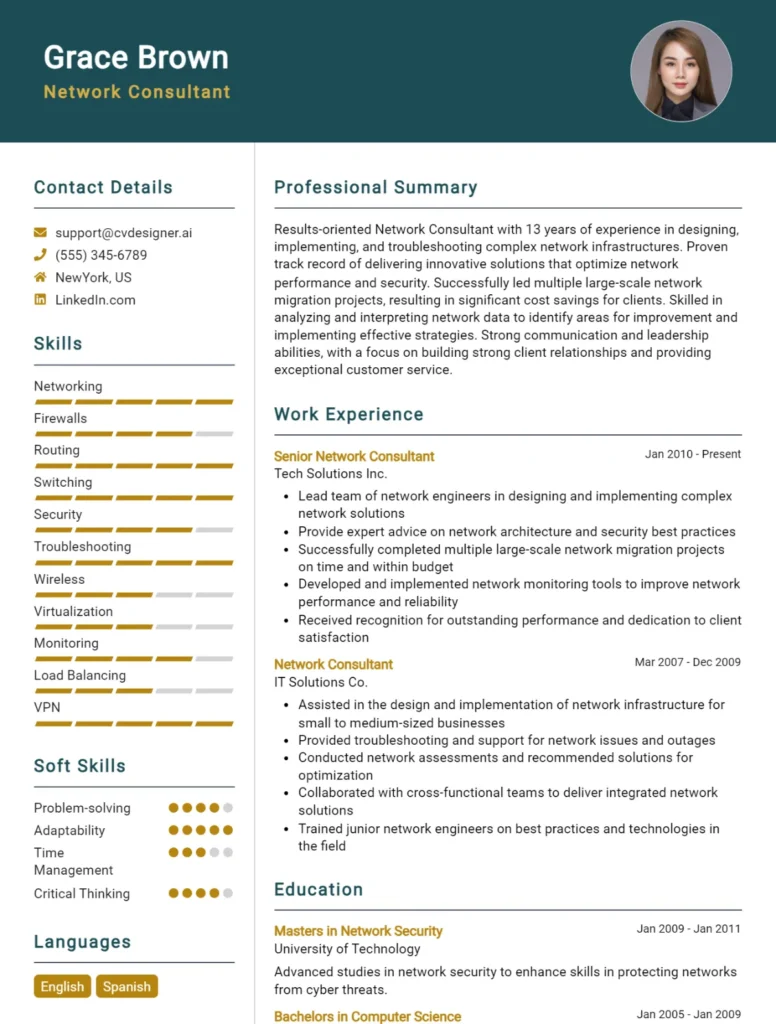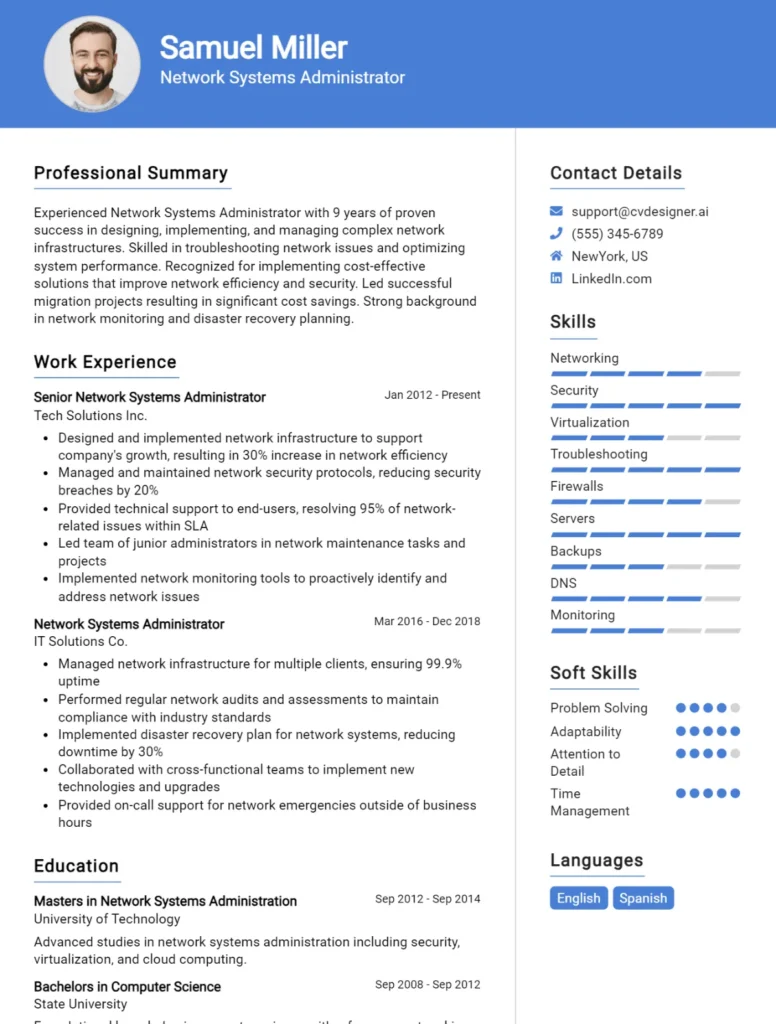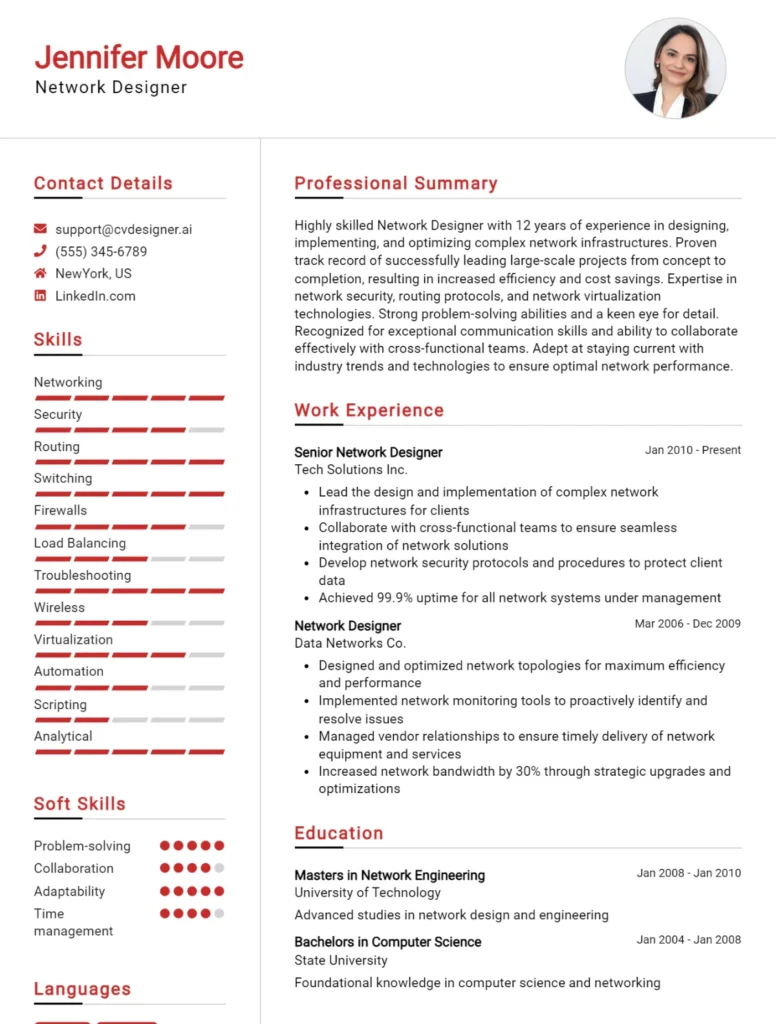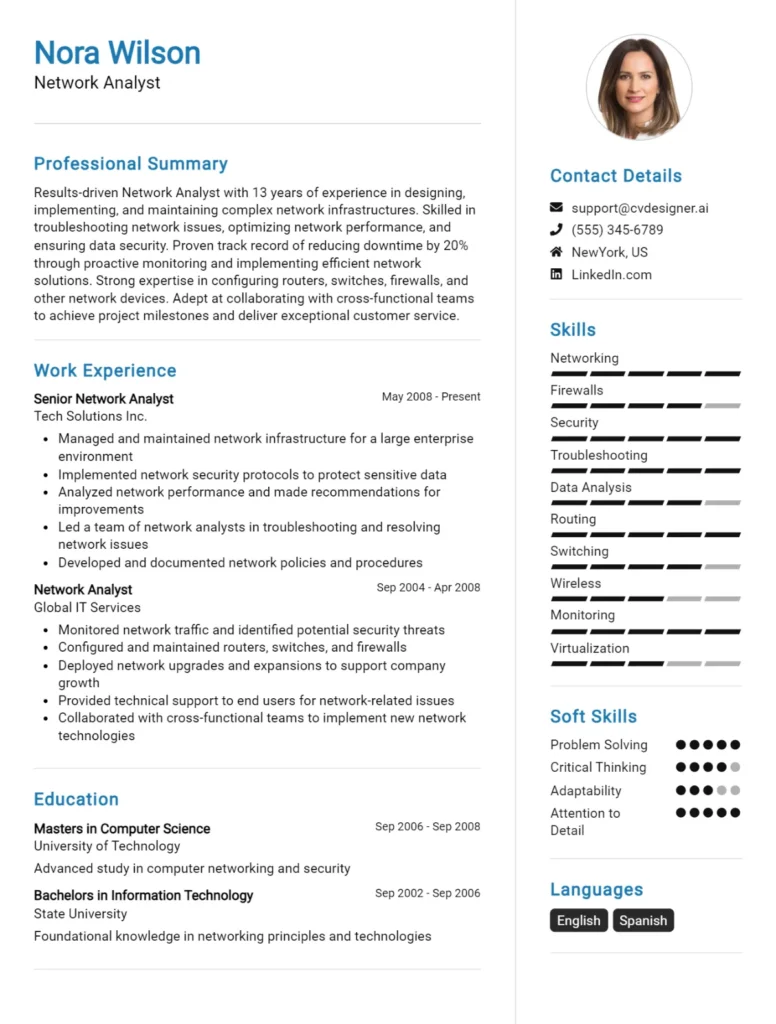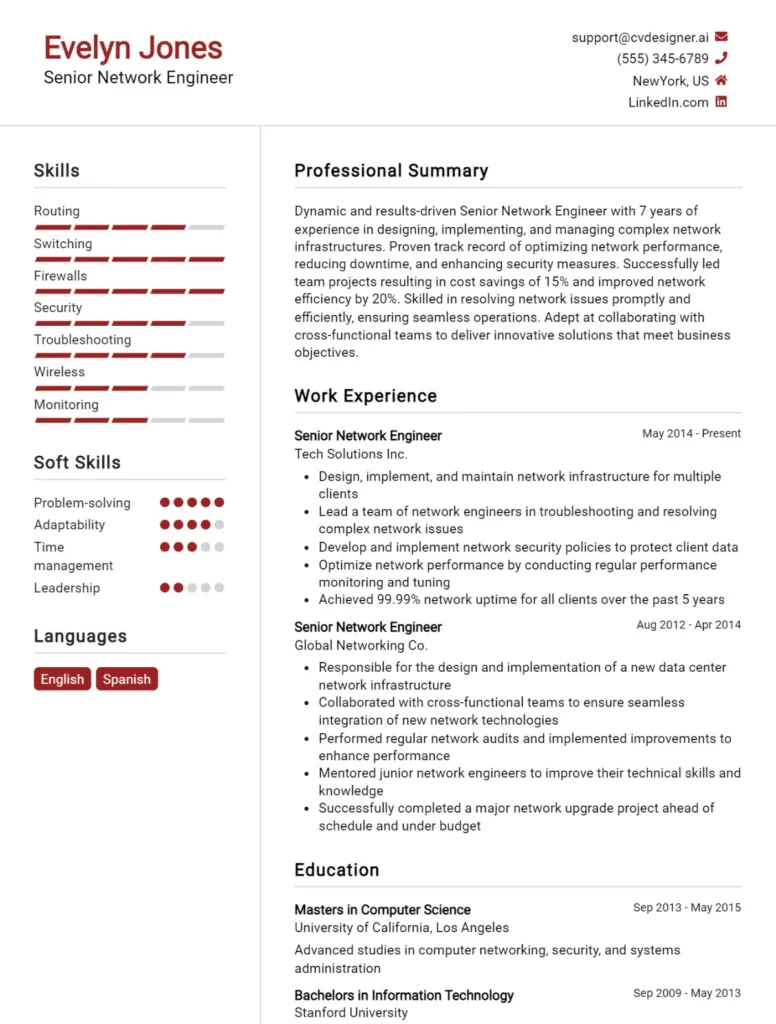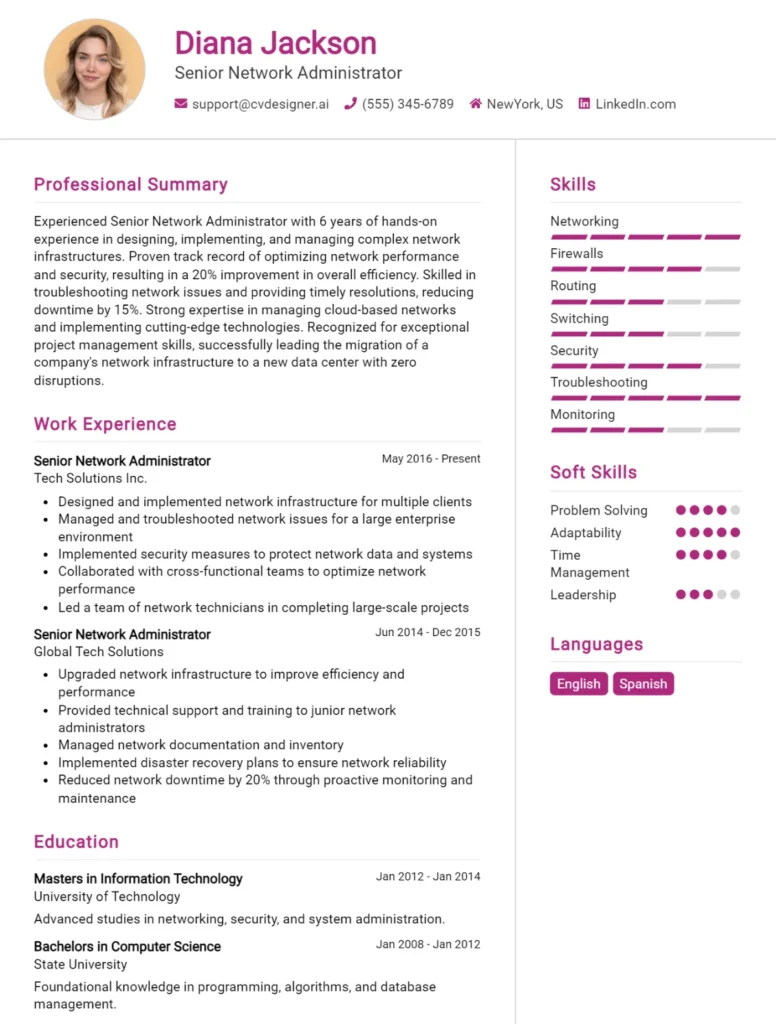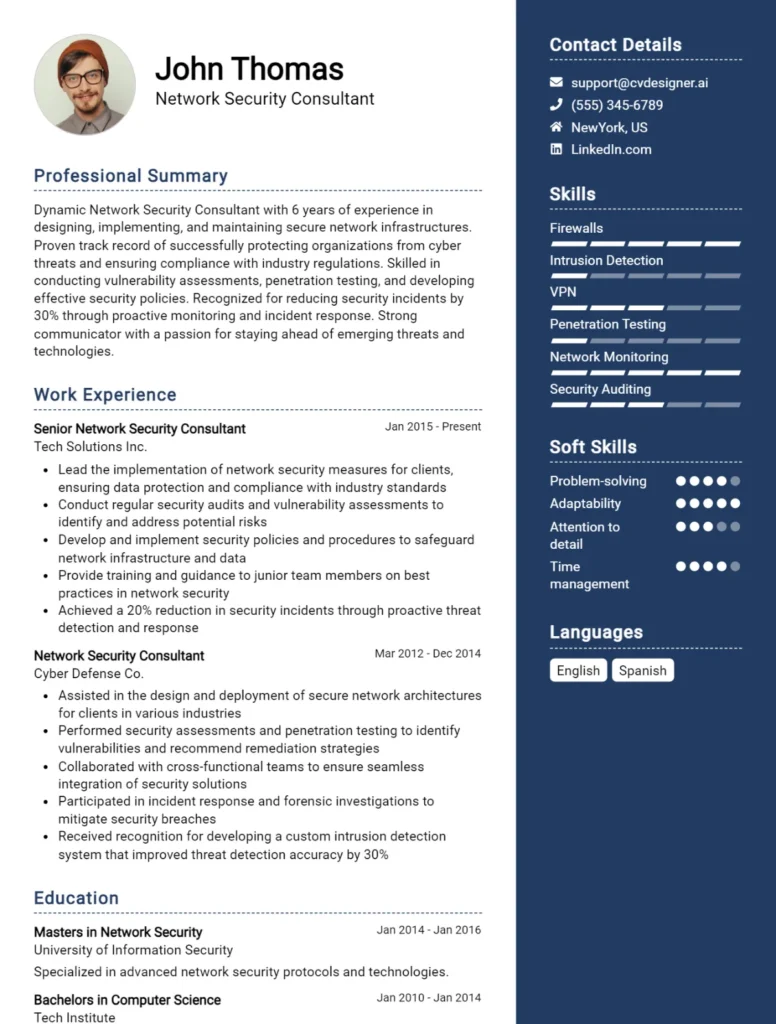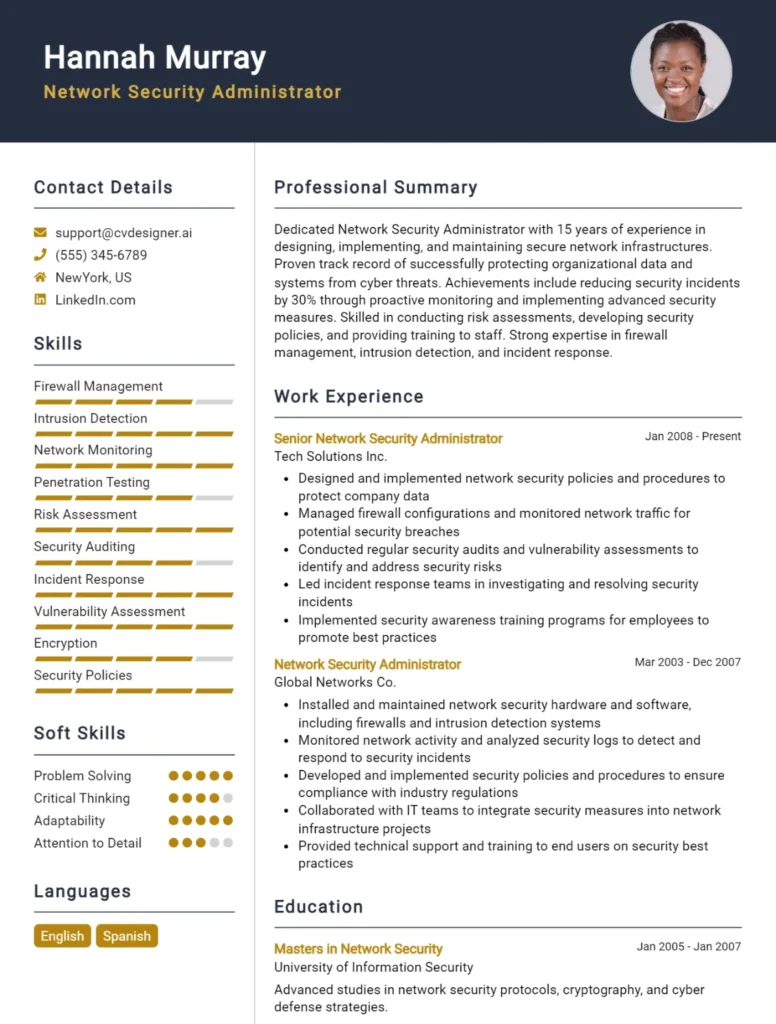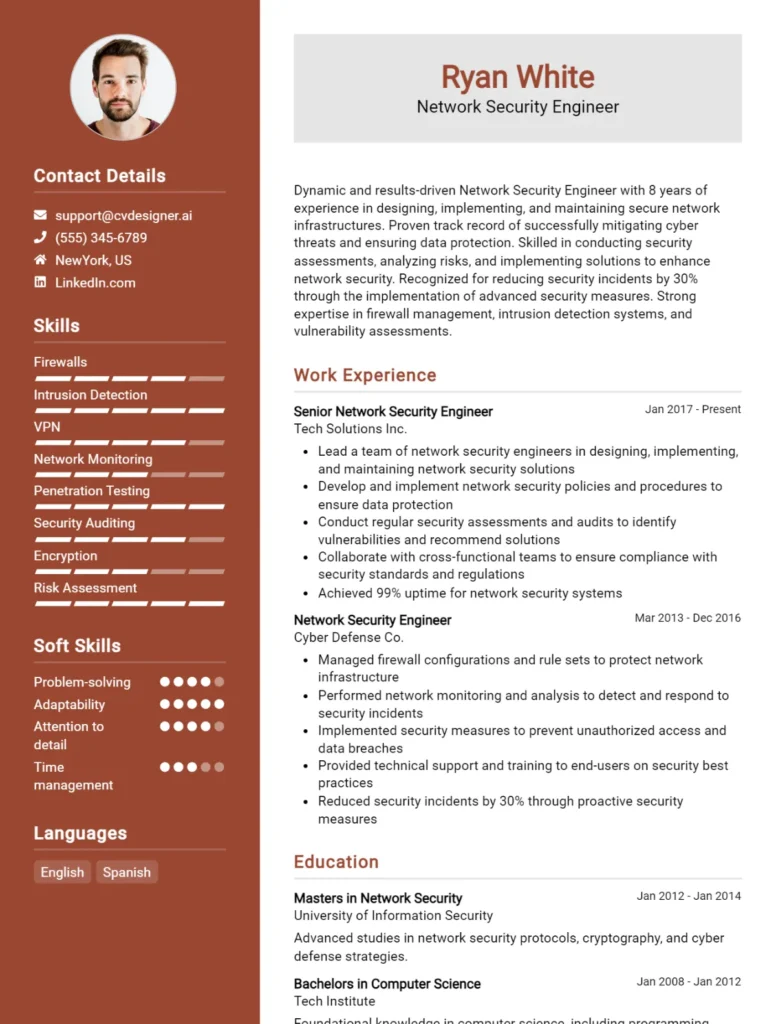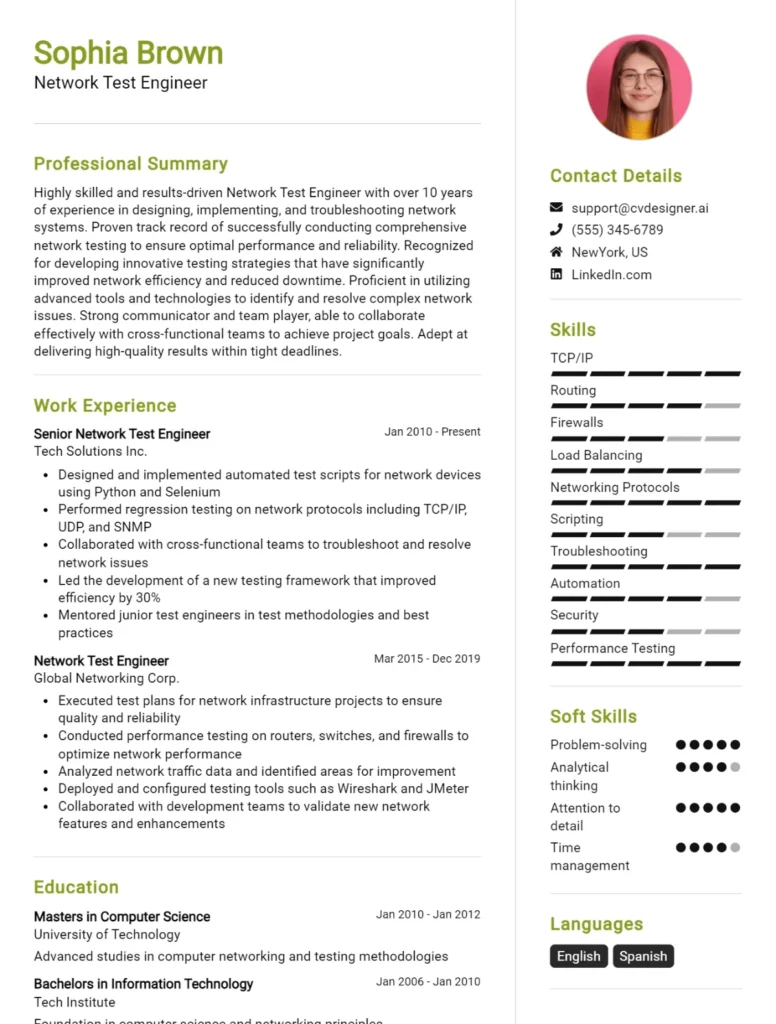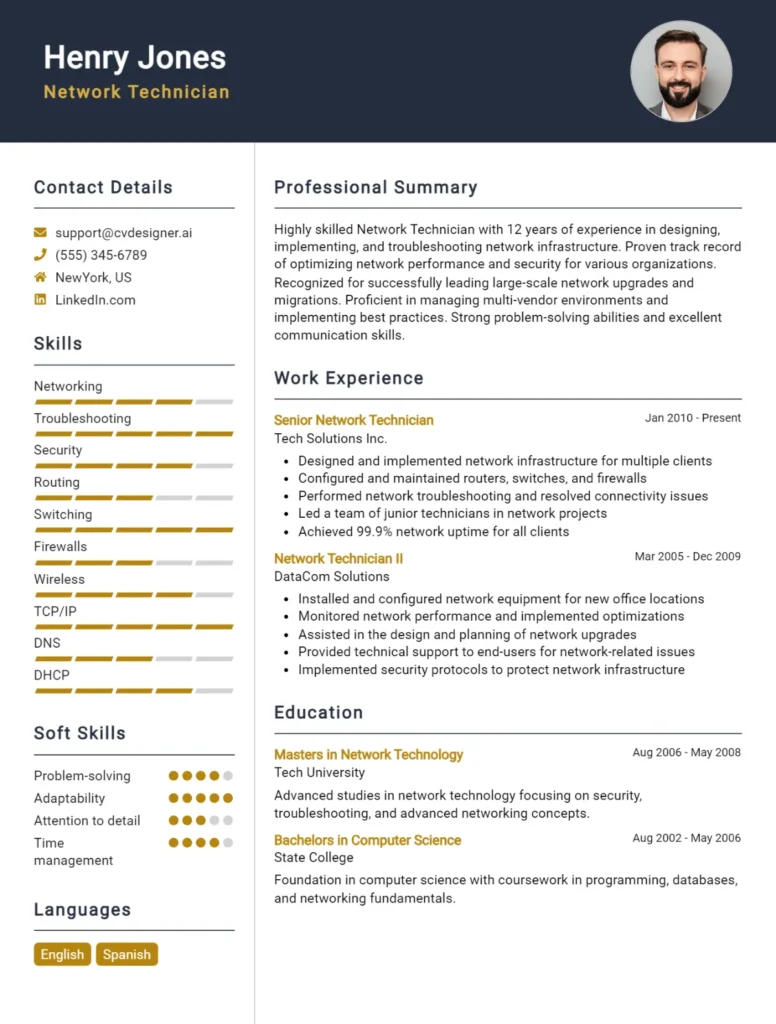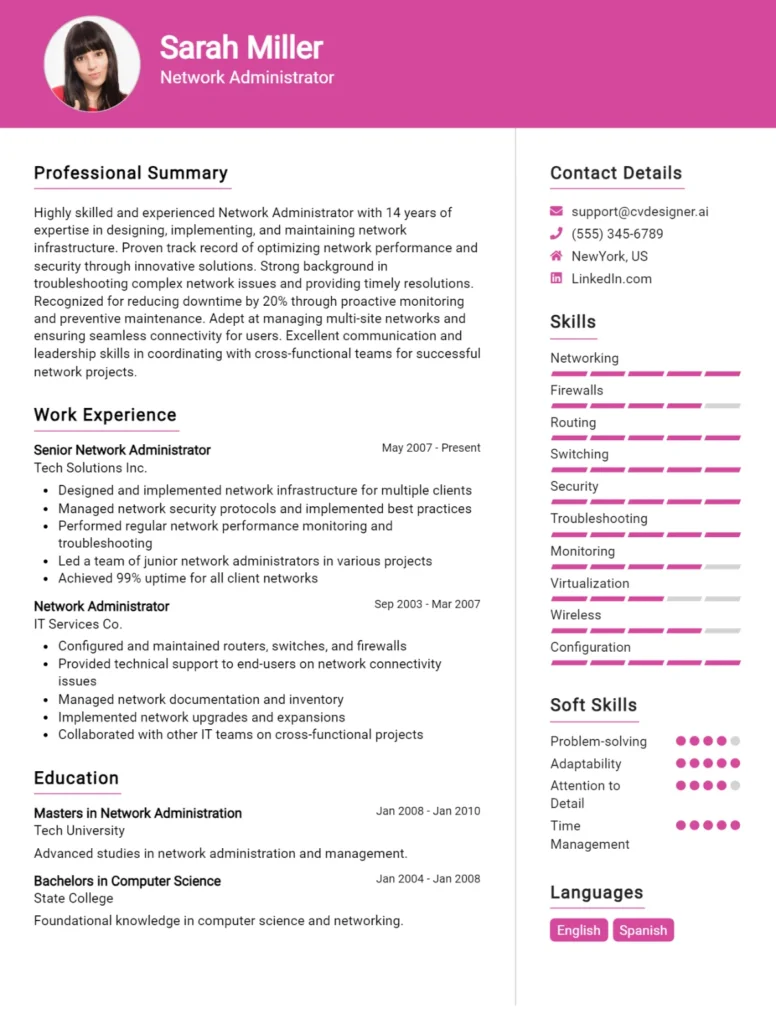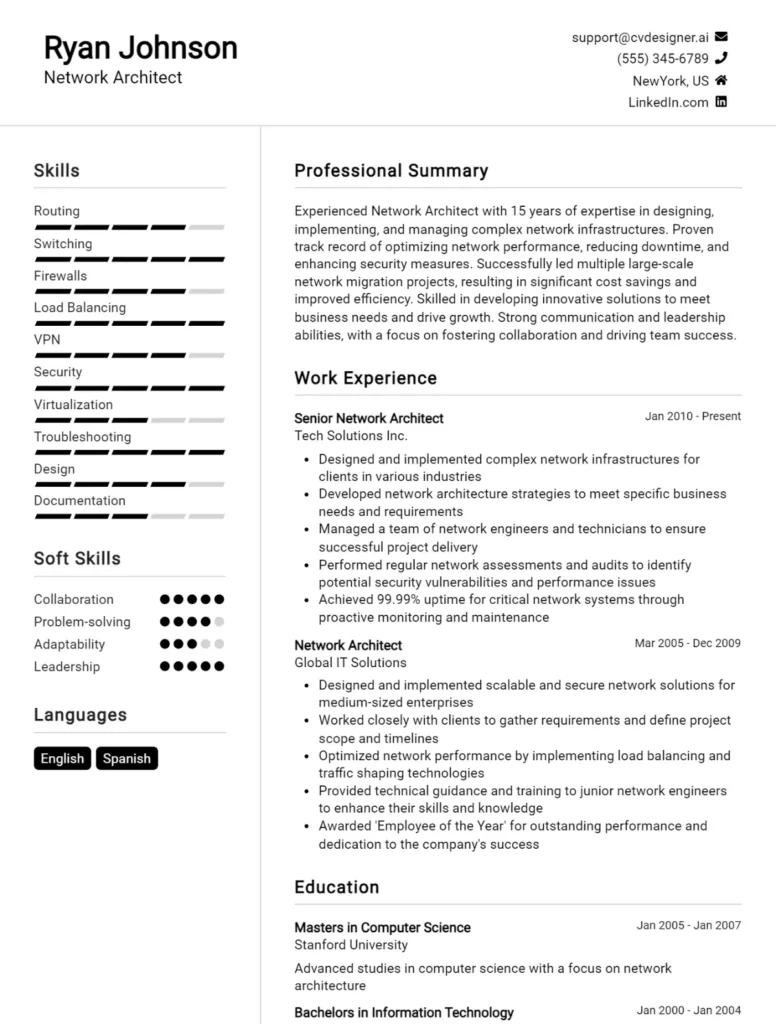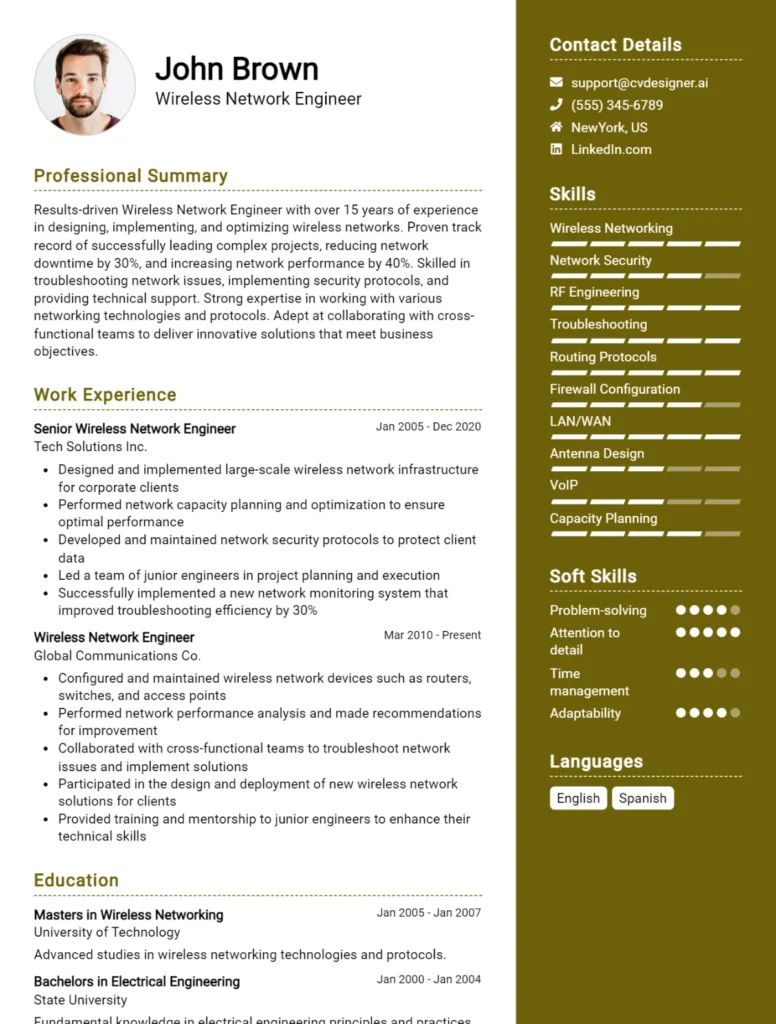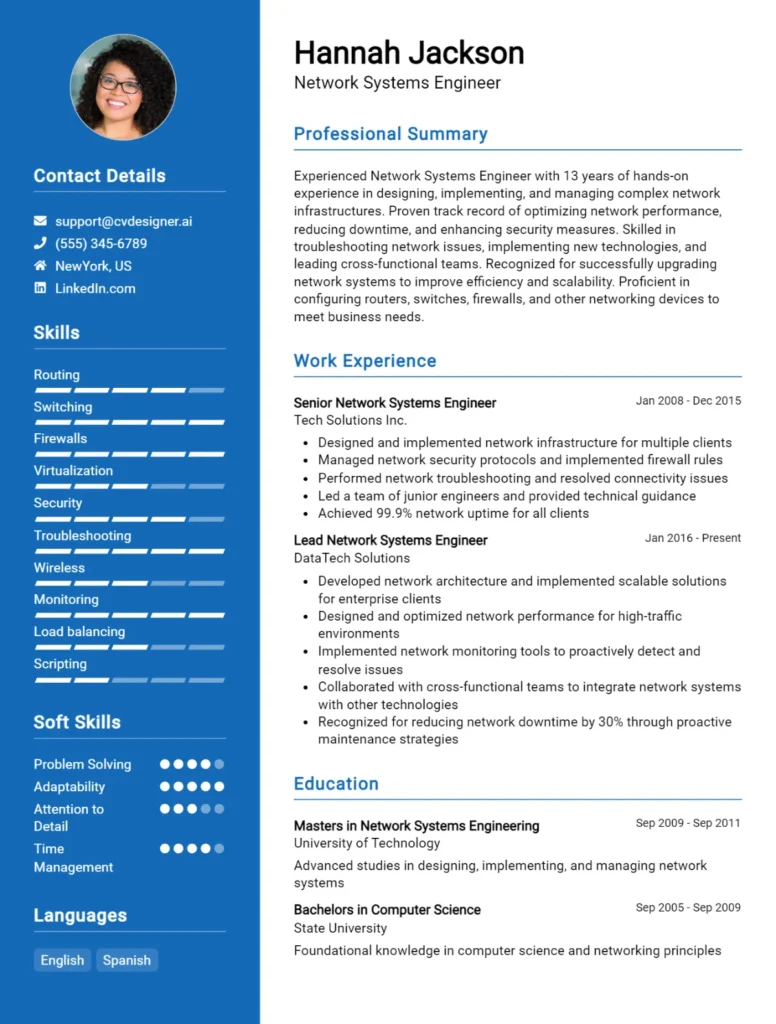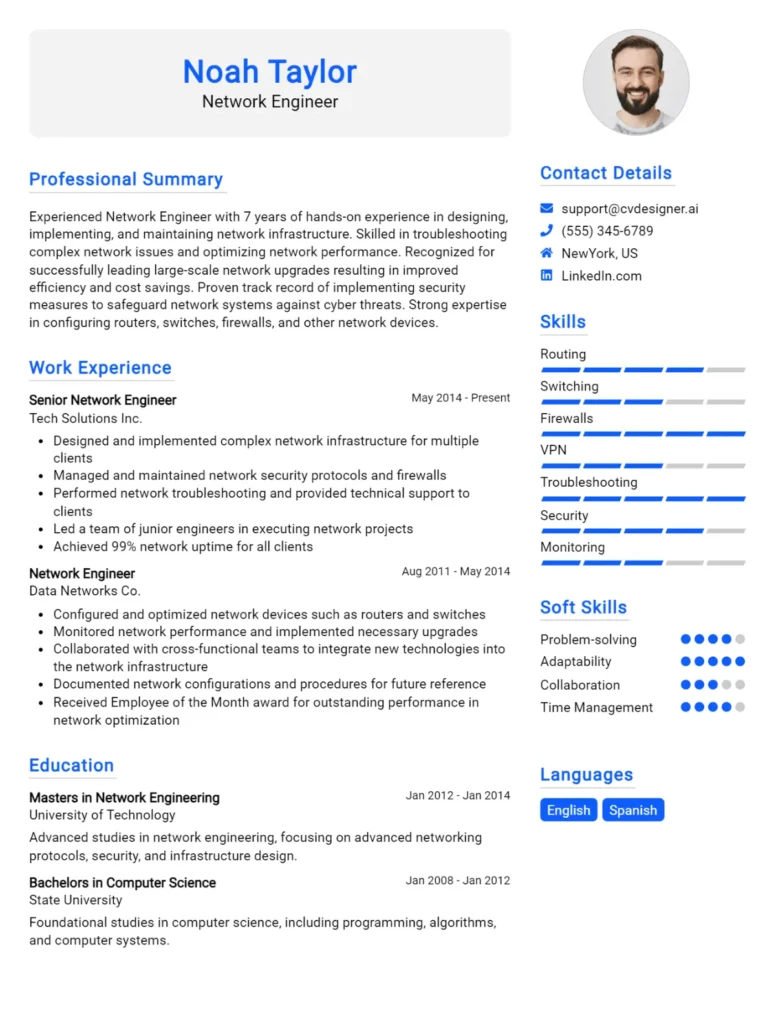Most Popular Network Support Engineer CV Examples
Explore additional Network Support Engineer CV samples and guides and see what works for your level of experience or role.
Crafting an impressive CV as a Network Support Engineer is essential in standing out in a competitive job market. This guide will take you through the intricacies of creating a compelling CV that highlights your technical skills, experience, and qualifications effectively. Whether you’re a seasoned professional or just starting your career, understanding the nuances of CV writing can make all the difference. In this article, you will discover:
- Key components to include in your CV to attract hiring managers
- Tips for showcasing your technical skills and certifications
- Strategies for demonstrating your problem-solving abilities and experience
- Examples of impactful wording and formatting to enhance readability
- Common mistakes to avoid when writing your CV
By the end of this guide, you will have a clear roadmap to create a standout CV that showcases your potential as a Network Support Engineer. Let’s dive in!
What is a Network Support Engineer CV?
A Network Support Engineer CV is a crucial document that outlines the skills, qualifications, and experiences of a professional in the field of network support. It serves as a first impression for potential employers, showcasing the candidate's technical expertise in managing and troubleshooting network systems. A well-crafted CV not only highlights relevant certifications and educational background but also emphasizes practical experience with networking technologies, protocols, and tools. This is essential for demonstrating competency in maintaining network performance and security, which are vital for any organization's operations.
The importance of a CV for a Network Support Engineer cannot be overstated, as it directly impacts job prospects and career advancement opportunities. A compelling CV effectively communicates the engineer's ability to analyze network issues, implement solutions, and collaborate with IT teams to ensure seamless connectivity. To create an impressive CV, candidates can refer to a comprehensive cv writing guide that offers tips and best practices. Additionally, utilizing a cv maker can streamline the process, allowing engineers to present their qualifications in a professional and visually appealing format, thereby increasing their chances of securing interviews in a competitive job market.
Key Components of a Network Support Engineer CV
- Contact Information: Include your full name, phone number, email address, and LinkedIn profile to ensure potential employers can easily reach you.
- Professional Summary: Write a brief overview of your experience, skills, and career objectives, tailored to the network support engineering role.
- Technical Skills: Highlight relevant technical skills such as knowledge of networking protocols (TCP/IP, DNS, DHCP), firewall configurations, and troubleshooting methodologies. For more details on essential skills, check this link.
- Certifications: List any relevant certifications, such as CompTIA Network+, Cisco CCNA, or Juniper JNCIA, which demonstrate your expertise in networking technologies.
- Work Experience: Detail your previous work experiences, focusing on roles related to network support or engineering. Ensure to include specific responsibilities and achievements, and refer to more guidance on work experience to enhance this section.
- Education: Provide information about your educational background, including degrees earned and institutions attended, particularly highlighting any coursework related to computer networking.
- Projects: Describe any significant projects you have worked on that are relevant to network support, showcasing your problem-solving skills and technical knowledge.
- Professional Affiliations: Mention any memberships in professional organizations, such as the IEEE or local networking groups, to demonstrate your commitment to the field.
- Soft Skills: Include important soft skills such as communication, teamwork, and analytical thinking, which are crucial for a Network Support Engineer role.
- Languages: If applicable, list any foreign languages you speak, as bilingualism can be an asset in diverse work environments.
- References: Offer references or state that they are available upon request, providing credibility to your application.
- Additional Information: Include any other relevant information such as volunteer work, internships, or personal projects that could enhance your CV and show your passion for networking.
Sample Network Support Engineer CV for Inspiration
John Doe
123 Networking Lane
Tech City, TC 12345
(123) 456-7890
john.doe@email.com
www.linkedin.com/in/johndoe
Professional Summary
Dedicated and detail-oriented Network Support Engineer with over 5 years of experience in managing, troubleshooting, and optimizing network systems. Proven expertise in configuring routers, switches, and firewalls while ensuring high levels of network availability and performance. Adept at providing technical support to clients and maintaining effective communication across all levels of an organization. Strong analytical skills with a commitment to delivering exceptional service and support in fast-paced environments.
Work Experience
Network Support Engineer
Tech Solutions Inc., Tech City, TC
June 2020 – Present
- Manage and support a wide range of network infrastructure including routers, switches, firewalls, and wireless access points.
- Conduct regular system audits to ensure network security and performance, implementing necessary upgrades and patches.
- Collaborate with the IT team to resolve complex network issues, achieving a 95% resolution rate on first contact.
- Develop and maintain comprehensive documentation of network configurations, procedures, and policies.
- Provide training and support for junior staff, enhancing team skills and knowledge base.
Network Technician
Connect IT Services, Tech City, TC
March 2018 – May 2020
- Assisted in the installation and configuration of network devices, including switches and wireless access points, for various client sites.
- Monitored network performance and conducted troubleshooting for connectivity issues, resulting in improved uptime by 30%.
- Supported end-users with network-related issues via phone, email, and in-person, ensuring timely resolutions.
- Maintained inventory of network equipment and supplies, facilitating efficient resource allocation and management.
IT Support Specialist
Network Solutions Ltd., Tech City, TC
January 2016 – February 2018
- Provided technical support for hardware and software issues, focusing on network connectivity problems.
- Assisted in the implementation of new network solutions and upgrades, ensuring seamless transitions for clients.
- Created user manuals and training materials to educate clients on network best practices and security policies.
- Participated in on-call support rotation, addressing critical network issues outside of regular business hours.
Education
Bachelor of Science in Information Technology
University of Tech City, Tech City, TC
Graduated: May 2015
Skills
- Proficient in network configuration and troubleshooting (Cisco, Juniper, etc.)
- Strong knowledge of TCP/IP, DNS, DHCP, and VPN technologies
- Experience with network monitoring tools (Wireshark, SolarWinds)
- Familiarity with cloud networking solutions (AWS, Azure)
- Excellent problem-solving and analytical skills
- Strong communication and interpersonal abilities
Certifications
- Cisco Certified Network Associate (CCNA) – 2021
- CompTIA Network+ – 2020
- Certified Information Systems Security Professional (CISSP) – 2022
Publications
- "Optimizing Network Performance: Best Practices for Businesses" – Published in Tech Journal, June 2023
- "Understanding the Importance of Network Security" – Contributor to IT Magazine, December 2022
Network Support Engineer CV Writing Tips
When crafting a CV for a Network Support Engineer position, it's crucial to highlight both your technical expertise and problem-solving abilities. Your CV should begin with a strong summary that captures your experience in managing and troubleshooting network systems. Be sure to showcase relevant certifications, such as CCNA or CompTIA Network+, and include specific examples of how you've successfully resolved network issues or improved system performance. Tailor your CV to the job description, using industry-specific terminology to demonstrate your familiarity with networking protocols and technologies. Lastly, keep your formatting clean and professional to ensure readability.
- Customize Your Summary: Tailor your opening summary to reflect the specific skills and experiences that align with the job you are applying for.
- Highlight Relevant Certifications: List any industry-recognized certifications prominently, such as CCNA, CompTIA Network+, or Juniper certifications.
- Detail Technical Skills: Include a dedicated section for technical skills, specifying software, hardware, and networking protocols you are proficient in (e.g., TCP/IP, DNS, DHCP).
- Showcase Problem-Solving Examples: Provide concrete examples of past experiences where you successfully diagnosed and resolved network issues.
- Include Metrics and Achievements: Where possible, quantify your accomplishments (e.g., reduced downtime by 20% or improved network performance by 30%).
- Emphasize Soft Skills: Don’t forget to mention soft skills, such as teamwork, communication, and customer service, which are essential for a support role.
- Keep it Concise: Aim for a CV length of one to two pages, focusing on the most relevant experiences and skills.
- Proofread Thoroughly: Ensure your CV is free from typos and grammatical errors to present a professional image.
Network Support Engineer CV Summary Examples
As a Network Support Engineer, your CV summary is a critical component that highlights your skills, experience, and the value you can bring to potential employers. Here are some effective examples of CV summaries tailored for this role:
Dedicated Network Support Engineer with over 5 years of experience in troubleshooting, configuring, and maintaining complex network infrastructures. Proven ability to enhance network performance and reliability, ensuring seamless communication across all levels of the organization.
Results-driven Network Support Engineer skilled in diagnosing and resolving network issues with a strong emphasis on customer satisfaction. Expertise in implementing security protocols and optimizing network performance, complemented by certifications in Cisco and CompTIA Network+.
Dynamic Network Support Engineer with a solid background in both hardware and software troubleshooting. Adept at collaborating with cross-functional teams to design and implement network solutions that align with business objectives, while also reducing downtime and improving system efficiency.
Motivated Network Support Engineer with extensive experience in providing technical support for network operations. Strong analytical skills and a track record of successfully managing network upgrades and installations, ensuring high levels of performance and security.
Detail-oriented Network Support Engineer with a passion for technology and a commitment to continuous improvement. Highly skilled in utilizing various network monitoring tools to proactively manage and optimize network systems, enhancing overall performance and user experience.
Build a Strong Experience Section for Your Network Support Engineer CV
As a Network Support Engineer, showcasing your relevant work experience is crucial to demonstrate your technical skills and problem-solving abilities. Below are examples of strong work experience descriptions that highlight key responsibilities and achievements in the role. Tailoring these examples to reflect your personal experiences will help you create a compelling CV.
- Provided 24/7 network support for a multi-site organization, troubleshooting connectivity issues and reducing downtime by 30% through proactive monitoring and rapid response protocols.
- Configured and maintained routers, switches, and firewalls, ensuring optimal network performance and security in compliance with industry standards and best practices.
- Collaborated with cross-functional teams to design and implement network upgrades, resulting in a 40% increase in bandwidth and improved overall system reliability.
- Conducted regular network assessments and performance tuning, identifying bottlenecks and implementing solutions that enhanced data flow efficiency by 25%.
- Developed and maintained comprehensive network documentation, including diagrams and configuration guides, which improved onboarding processes and knowledge transfer within the team.
- Assisted in the deployment of a new VoIP system, providing technical support and training to end-users, leading to a seamless transition and enhanced communication capabilities across the organization.
- Diagnosed and resolved complex network issues involving WAN, LAN, and VPN technologies, utilizing tools such as Wireshark and SolarWinds to ensure high availability and performance.
- Implemented network security measures, including intrusion detection systems and regular vulnerability assessments, which resulted in a 50% reduction in security incidents over a two-year period.
Network Support Engineer CV Education Examples
A well-rounded educational background is crucial for a Network Support Engineer, as it equips candidates with the necessary technical skills and theoretical knowledge to excel in the field. Below are examples of relevant educational qualifications that can enhance a candidate's profile for this role:
- Bachelor of Science in Computer Networking
This degree provides a comprehensive understanding of networking principles, including network design, management, and security protocols. - Bachelor of Science in Information Technology
A broad IT background that covers various aspects of technology, including systems administration, security, and network management, which are essential for troubleshooting and supporting network infrastructures. - Associate Degree in Network Administration
Focused on the practical skills needed for managing and supporting network systems, this degree often includes hands-on training in routers, switches, and network configuration. - Certification in Cisco Certified Network Associate (CCNA)
A widely recognized certification that validates the skills required to install, configure, and troubleshoot networks, making it a valuable addition to any network support engineer’s education. - Master of Science in Cybersecurity
This advanced degree provides in-depth knowledge of securing networks against threats, which is increasingly important in a world where cyber threats are prevalent.
Skills to Highlight in Your Network Support Engineer CV
As a Network Support Engineer, showcasing a blend of technical expertise and interpersonal skills is crucial in demonstrating your ability to maintain and enhance network performance. Your CV should reflect not only your hard skills related to network management and troubleshooting but also the soft skills that enable you to work effectively within a team, communicate with clients, and adapt to changing technologies.
Soft Skills:
- Communication Skills
- Problem-Solving Abilities
- Team Collaboration
- Time Management
- Adaptability
- Attention to Detail
- Customer Service Orientation
- Critical Thinking
- Conflict Resolution
- Patience and Empathy
Hard Skills:
- Network Configuration and Management
- Knowledge of Routing and Switching Protocols
- Proficiency in Network Monitoring Tools
- Firewall and Security Protocols
- Troubleshooting Network Issues
- Experience with VPNs and Remote Access Technologies
- Understanding of TCP/IP and OSI Models
- Familiarity with Network Hardware (e.g., Routers, Switches)
- Scripting and Automation Skills (e.g., Python, Bash)
- Knowledge of Cloud Networking Solutions
Network Support Engineer CV Format
As a Network Support Engineer, your CV should reflect both your technical expertise and your ability to troubleshoot network issues efficiently. The best format for your CV can vary depending on your level of experience, but a chronological format is generally preferred for showcasing your career progression. For entry-level positions, a functional format may also work well to highlight relevant skills. Regardless of the format, ensure that your CV is clear, concise, and tailored to the job you are applying for. For more detailed guidance, check out this cv format article.
- Start with a strong summary that highlights your relevant experience and technical skills in networking.
- List your work history in reverse chronological order, emphasizing achievements and responsibilities in previous roles.
- Include a dedicated skills section that showcases your expertise in network protocols, troubleshooting, and tools.
- Add relevant certifications such as CCNA, CompTIA Network+, or others to demonstrate your qualifications.
- Highlight any projects or key accomplishments that demonstrate your ability to resolve complex network issues.
- Tailor your CV for each application by aligning your experience and skills with the specific requirements of the job.
Common Mistakes to Avoid in a Network Support Engineer CV
When crafting a CV for a Network Support Engineer position, it's essential to present your skills and experiences in a clear and impactful manner. A well-structured CV can significantly enhance your chances of landing an interview, while common pitfalls can undermine your qualifications and detract from your professional image. To help you create a compelling CV, here are some common mistakes to avoid:
- Neglecting to Tailor Your CV: Failing to customize your CV for each job application, resulting in a generic document that doesn't highlight relevant skills.
- Omitting Technical Skills: Not explicitly listing technical proficiencies, certifications, or tools that are crucial for the role, like networking protocols and troubleshooting techniques.
- Using Jargon Excessively: Overloading the CV with technical jargon that may not be easily understood by hiring managers or recruiters.
- Lack of Quantifiable Achievements: Providing vague descriptions of past responsibilities instead of showcasing specific accomplishments with measurable outcomes.
- Poor Formatting: Using inconsistent formatting, fonts, or spacing that makes the CV difficult to read and unprofessional in appearance.
- Ignoring Soft Skills: Underestimating the importance of soft skills, such as communication and teamwork, which are vital in a support role.
- Including Irrelevant Information: Adding unrelated work experiences or hobbies that do not support your candidacy for a Network Support Engineer position.
- Typos and Grammatical Errors: Submitting a CV with spelling mistakes or grammatical errors, which can undermine your attention to detail and professionalism.
- Not Including Contact Information: Failing to provide updated contact information, making it hard for employers to reach you for interviews.
- Listing Responsibilities Instead of Results: Focusing solely on job duties instead of highlighting how your contributions benefited previous employers or projects.
Key Takeaways for a Network Support Engineer CV
- Contact Information: Include your name, phone number, email address, and LinkedIn profile at the top of your CV for easy accessibility.
- Professional Summary: Write a brief overview highlighting your experience, skills, and what you bring to the role of a Network Support Engineer. Tailor it to reflect the specific job you are applying for.
- Technical Skills: List relevant technical skills, such as knowledge of networking protocols (TCP/IP, DNS, DHCP), firewall management, and experience with network monitoring tools. Use bullet points for clarity.
- Certifications: Highlight any relevant certifications, such as CCNA, CompTIA Network+, or other industry-recognized credentials that demonstrate your expertise.
- Work Experience: Detail your professional experience in reverse chronological order, focusing on your responsibilities and achievements in previous roles. Include specific metrics or outcomes where possible.
- Education: Include your educational background, mentioning your degree(s), institution(s), and graduation dates. If you have relevant coursework or projects, consider listing them.
- Problem-Solving Skills: Emphasize your ability to troubleshoot and resolve network issues efficiently. Provide examples of challenges you've tackled in previous positions.
- Communication Skills: Showcase your ability to communicate technical information clearly to non-technical stakeholders, as this is crucial in a support role.
- Project Experience: If applicable, describe any significant projects you've worked on, detailing your contributions and the technologies used.
- Continuous Learning: Indicate your commitment to professional development through ongoing education, training, or participation in networking communities.
- Customization: Tailor your CV for each application to align with the specific job description and requirements.
- Visual Appeal: Consider using professional cv templates to create a visually appealing layout. This can make your CV stand out to potential employers.
- Cover Letter: Don’t forget to pair your CV with a compelling cover letter. Use cover letter templates to guide your writing process and make a strong first impression.
- Online Tools: Utilize a cv builder to streamline the creation of your CV, ensuring it is formatted correctly and professionally presented.
Build your CV in minutes
Use an AI-powered cv builder and have your cv done in 5 minutes. Just select your template and our software will guide you through the process.
